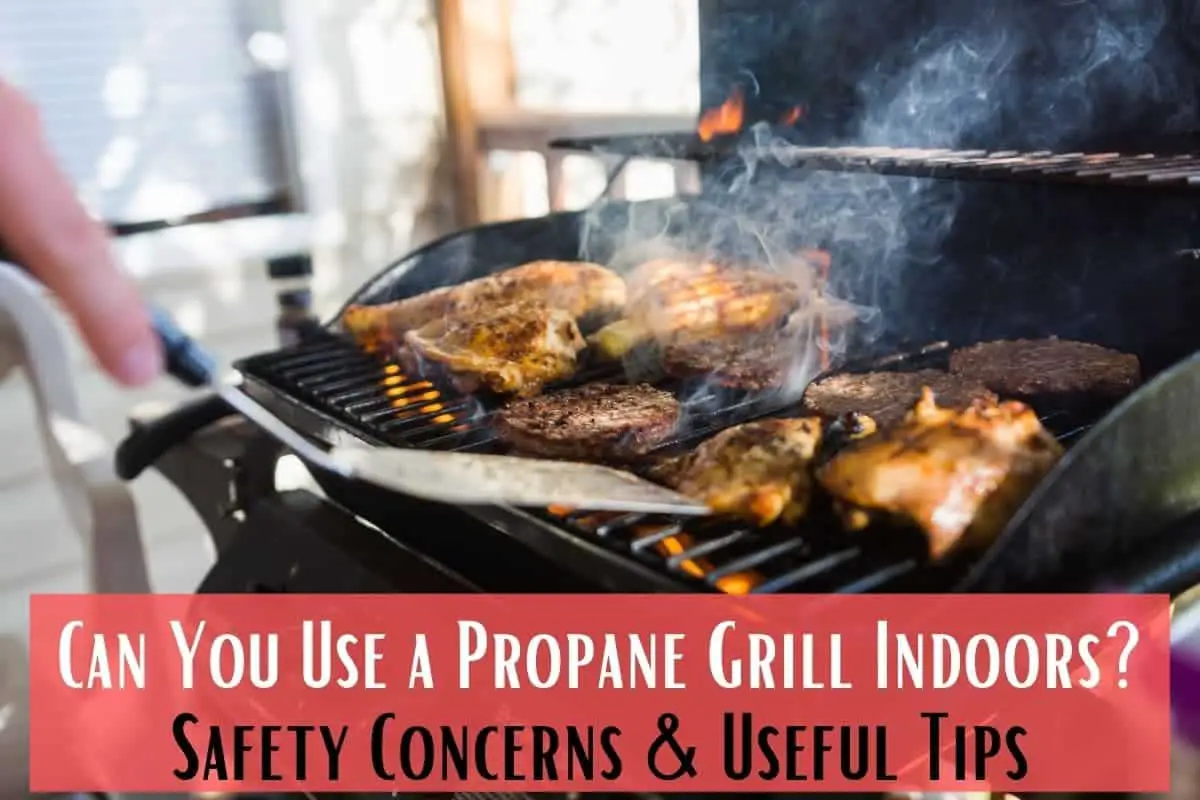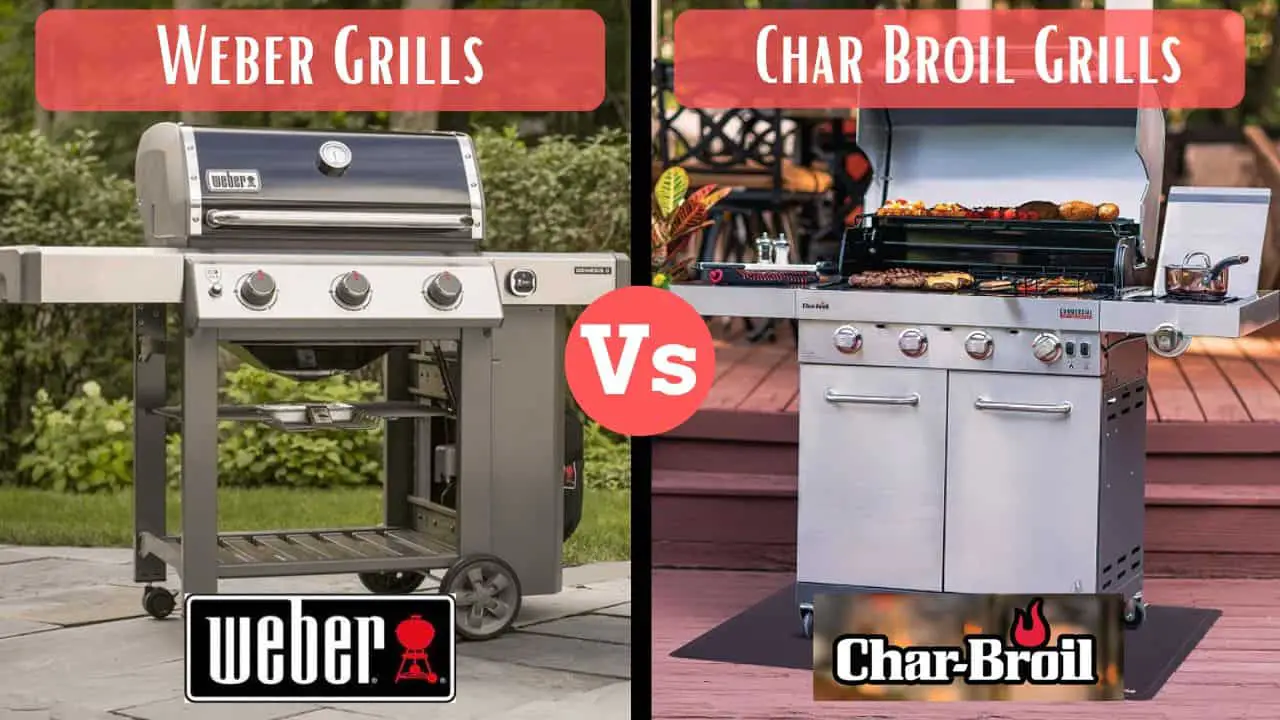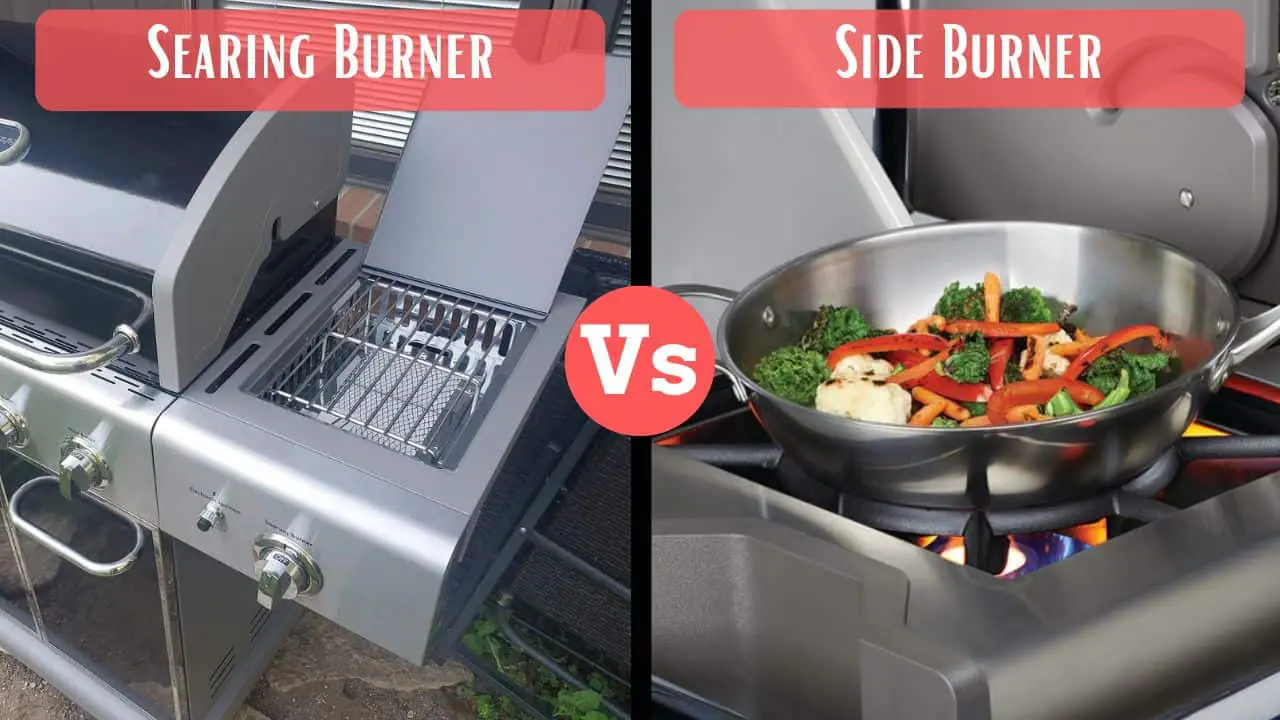When the weather kicks in rough, there’s not a single person who would get soaking wet to grill a bit of meat – not even me. To tell you the truth, I did try it once, with my propane grill, since, well, I was craving some pork chops. Not the wisest decision I’ve made, though.
The propane grill worked fine in the rain, but it was all fun and games until my pork chops got all soggy and mushy. The grill was on course, yet the meat didn’t cooperate, if you will. And then, there was the risk of getting my propane grill all rusty – a huge no.
Suffice to say that I won’t ever propane-grill in the rain again. But, then, I won’t be using the propane grill at home either.
Yes, I’ve seen you wondering “can you use a propane grill indoors? Is it safe?”.
That’s why my friends, I’m going to answer this question and a bunch more tips and tricks to see whether it’s a good idea to utilize your propane grill indoors.

So let’s get this grilling show on the road then, shall we?
Table of Contents
- 1 Can You Use a Propane Grill Indoors? Is it safe?
- 2 Why Can you Use a Propane Stove Indoors, but Not a Propane Grill?
- 3 How to Safely Use a Propane Grill Indoors?
- 4 What are the Hazards of Using a Propane Grill Indoors?
- 5 How to Detect a Gas Leak From a Propane Grill?
- 6 What to Do If There’s a Gas Leak from a Propane Grill Indoors?
- 7 Do propane grills give off carbon monoxide?
- 8 Can a carbon monoxide detector detect if there is a propane gas leak from my grill?
- 9 Can you get carbon monoxide poisoning from a propane grill?
- 10 Is it safe to keep a propane gas tank indoors?
Can You Use a Propane Grill Indoors? Is it safe?
Ah, propane grills, one of the simplest ways to get that barbecue going instantly. Just turn the valve of the propane tank counterclockwise and you’ve got yourself enough gas to start barbecuing whatever tickles your fancy.
But, propane grills aren’t as good as they sound when you want to use them indoors. Simply put, you shouldn’t utilize a propane grill indoors, and most importantly, not inside your apartment or house. A propane grill or griddle, whichever you’re opting for, releases tons of carbon monoxide, which doesn’t do your health justice.
If the gas accumulates in space due to insufficient ventilation, it will cause extensive harm to you and every possession in your housing. The propane grill tends to warm up faster than your regular oven, which in turn poses a significant fire threat.
Furthermore, there’s the risk of the propane gas leaking, and if it goes unnoticed – the consequences might be disastrous, to say the least. However, if you’re willing to risk it all and start to use a propane grill inside, you have to take extra safety precautions to dodge potential fire hazards.
Technically speaking, you can use a propane grill in a secure manner and with extreme caution. However, using a propane grill indoors has more risks than benefits. That’s why there are propane stoves that you can use indoors – but not a propane grill.
Why Can you Use a Propane Stove Indoors, but Not a Propane Grill?
Using a propane stove indoors comes with its own dangers. Still, it’s a tad safer to use a stove rather than using a propane grill inside your home.
For starters, even most propane stoves don’t have proper ventilation built on the inside, meaning you will face a great risk of carbon monoxide build-up.
However, when you buy a propane grill, on every instruction manual, you’ll see that it strictly suggests that you should use it outdoors only.
So, what makes a propane stove a better option to use indoors compared to a propane grill or griddle?
To tell you the truth, it’s all about the debris of food and ash, oily exterior, and all sorts of leftovers that the propane grill leaves behind. These oily residues and leftovers are a fire hazard waiting to happen before you’re done barbecuing your meat. Therefore, you should most certainly clean the propane grill after using it.
Flame hazards and smoke hazards are the most pressing concerns. The propane smoke carries around big amounts of carbon monoxide, and when the smoke mixes up with the fatty oil from the food, it may even result in posing a fire threat.
All in all, it’s not wise to just put the propane grill indoors and start barbecuing at home!
How to Safely Use a Propane Grill Indoors?
Even though you’re not recommended to use a propane grill indoors, there are people who will probably do it still.
I can’t stop them from grilling indoors with a propane grill, but I can at least try to offer some tips on staying safe in the meantime.
Here are 4 things you should keep in mind for a safer approach to grilling indoors with a propane grill.
- To begin, ensure that the connections, valves, and propane gas tank are properly checked before you even instigate using the grill indoors.
- Do not use a propane grill close to a wall, and take out anything that’s flammable in the vicinity of the grill.
- After you’re done checking the grill’s valves and its tank, it’s time to make sure that your space is well aired to prevent the rapid accumulation of CO. Bear in mind that you have to stay around the grill at all times, since you don’t want it unsupervised in case something goes wrong.
- Finally, the carbon monoxide detectors need to be turned on to track any above-average carbon dioxide leaks. If the carbon monoxide level is high, the alarms will sound off just like your regular smoke detectors.
What are the Hazards of Using a Propane Grill Indoors?
There are potential dangers of using a propane grill indoors, and risky ones, mind you.
Here are the possible hazards of using your propane grill indoors:
- No insulation: This is one of the main reasons why stoves can be used indoors while grills are best left for outdoor barbecuing. Without insulation, the grills build up a lot more heat – and really fast. So, if you have something plastic lying around nearby, it’ll probably melt down faster.
- Carbon monoxide threat: It goes without showing that a carbon monoxide build-up isn’t superb for your health, and it can even be deadly. A propane grill doesn’t have its insulation, whereas a stove has a vent hood to let all carbon monoxide out.
- Probable gas leakage: A gas leak might occur as a result of the propane gas tank since it isn’t as sturdy as your typical gas intake oven valve. Because it’s turned around again and again, gas leaks are absolutely plausible.
- Frail valves from the tank: You might know this, but around the world, propane tanks are reused over and over. When it’s time to refill the tank, you replace your old one with a new tank. However, note that the ”new” tank you bought was likely refilled again and again – and mended – which can make it frailer than the new thing.
Practically speaking, the worst possible scenario you’re looking at is a gas leak – and you should always be prepared for it.
How to Detect a Gas Leak From a Propane Grill?
Naturally available Propane gas has no odor. But in order to detect leakages, propane gas is mixed with a chemical called mercaptan to give it a foul “rotten egg” smell before they are filled in tanks.
In case there is a gas leakage, you will definitely get a “rotten egg” smell once you enter the room which houses the grill and the propane tank.
For the sake of your and others’ well-being, don’t go around the tank with a lighter to check if there’s a gas leak. If you do so, and a gas leak occurs, the consequences may be lethal.
What to Do If There’s a Gas Leak from a Propane Grill Indoors?
In case you have a propane gas grill or a filled tank in our home and get a “rotten egg” smell, you can be sure there is a gas leak.
This can be deadly if you do not take precautions, act fast and let the gas escape out.
Once you detect a gas leak from a Propane Grill gas tank do not try to put on any electrical switch, light, match stick, lighter or the grill. Basically do not do anything that can create a spark as it could potentially ignite the gas can create a fireball.
Here is what you should do immediately after detecting the gas leakage.
- Open all the doors and windows of the room so that the leaked gas can escape outside.
- Check the burner knobs of the grill, in case they are kept open by accident, and turn them off.
- Check the propane tank knob as well and ensure that it is closed.
Even after doing all the above, you still get the “rotten egg” smell from the gas leakage then it might be because of leakage in the gas hose connecting the cylinder to the grill or any other joints.
There’s a method called leak testing to figure out leakages like this, and here’s how to do it.
- Mix up a 50/50 solution of water and soap in a medium-sized bowl.
- Next, turn off all the knobs on the propane grill.
- Head to the gas tank, and turn it on.
- With a sponge or a standard kitchen brush, gently apply the solution where the valve, regulator, and hose are.
- Remember to apply the solution all the way to the end of the hose.
- If there are any leaks, you’ll see a bubble forming, and right there is where your leak is.
After checking if there’s a gas leak, and in case you do in fact find one – it’s time to reach out to the field experts.
According to the amount of gas that’s left in the tank itself, all you might need to do is change it. Therefore, always remember where you’ve bought your tank so that professionals can repair it or exchange it for a new and mended one.
In rare cases, if the leak persists, it is wise to make a call to your local fire department.
Do propane grills give off carbon monoxide?
Yes, propane grills do emit carbon monoxide, and so do charcoal grills. Failing to adequately ventilate the room and mend the grill may result in a dangerous situation for the user and those around them.
Can a carbon monoxide detector detect if there is a propane gas leak from my grill?
Carbon monoxide detectors can’t detect propane if your grill is leaking.
The detectors can only suspect and notify you if there are high carbon monoxide levels and if the fuel has burned. You have to hire a specialized detector to do proper propane detecting.
Can you get carbon monoxide poisoning from a propane grill?
It’s highly possible to receive carbon monoxide poisoning from a propane grill if you don’t use it safely. Charcoal grills and propane grills are both intended for outdoor usage. If you use them continuously indoors, the risks of getting carbon monoxide poisoning are bigger.
Is it safe to keep a propane gas tank indoors?
Propane gas tanks should not be kept indoors. Not in the kitchen, not in the garage, and definitely not near your stove or heat system. Extra dry, ventilated, and open spots are the best ones to keep a propane tank. If you have a propane tank that’s without any gas, then you can store it indoors.



